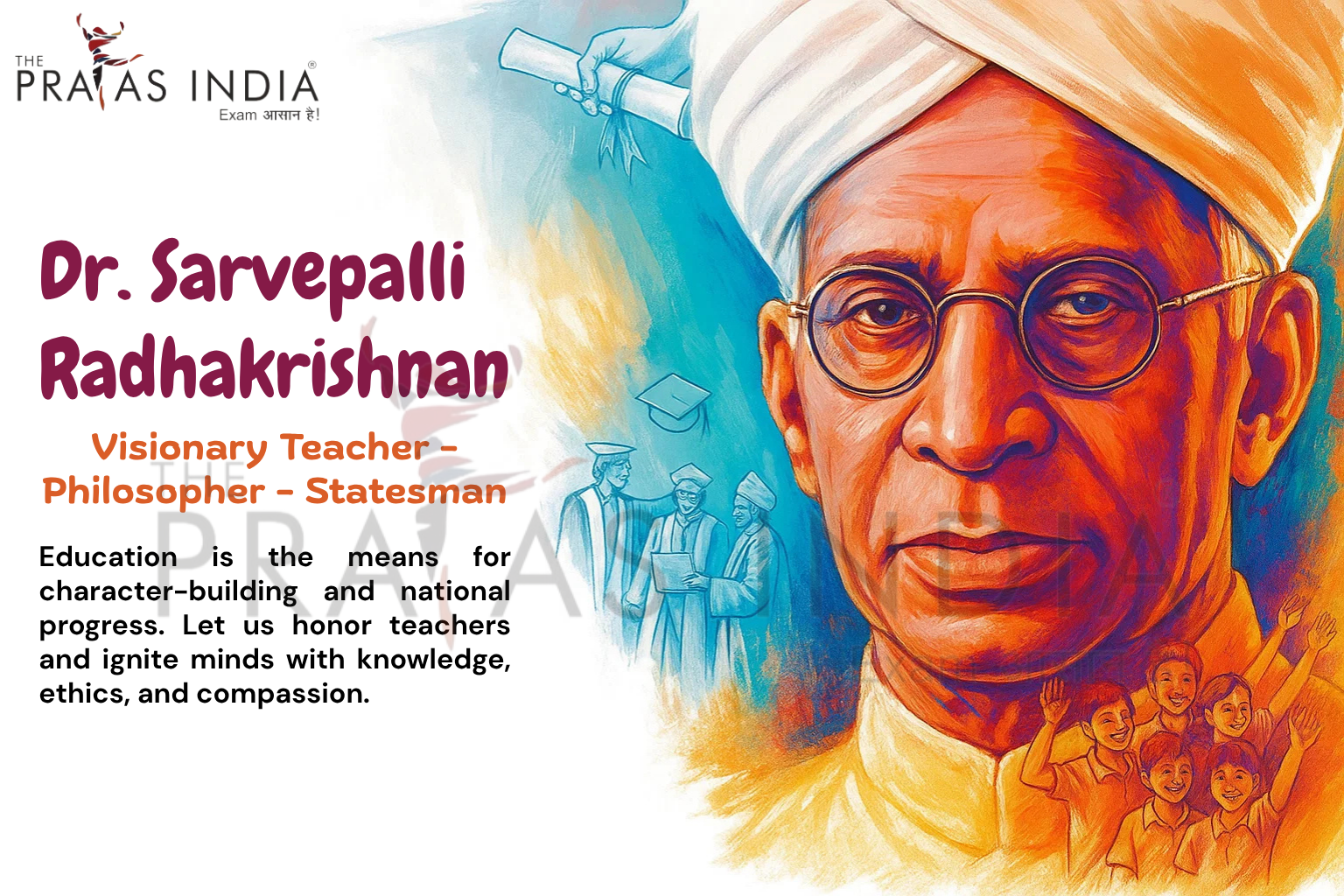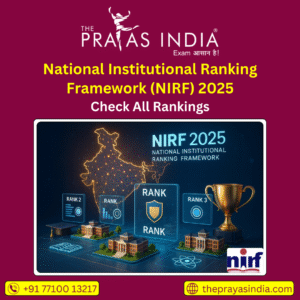Dr. Sarvepalli Radhakrishnan – Philosopher, Scholar, and Statesman
This topic is significant for UPSC Prelims (Modern Indian Thinkers & Education) and Mains GS Paper 4 (Ethics) and Paper 1 (Modern Indian History). Questions can be framed on Radhakrishnan’s philosophical contributions, views on ethics and education, legacy in Indian public life, and his role in globalizing Indian thought.
Introduction
Dr. Sarvepalli Radhakrishnan (1888–1975) remains one of India’s towering intellectuals, whose legacy encompasses philosophy, teaching, political statesmanship, and cultural advocacy. Revered for his scholarly insight, commitment to education, and moral leadership, he was India’s first Vice President and second President. His vision continues to shape India’s discourse on ethics and education, making him a vital subject for UPSC aspirants.

Early Life & Education
Born on September 5, 1888 in Tiruttani, Madras Presidency (present-day Tamil Nadu), Radhakrishnan belonged to a Telugu-speaking Brahmin family of modest means. His father, Sarvepalli Veeraswami, was a revenue official, and his mother, Sarvepalli Sita, instilled in him the values of discipline and learning. From an early age, Radhakrishnan showed exceptional academic brilliance, winning scholarships that supported his schooling at K.V High School (Tiruttani), Hermannsburg Evangelical Lutheran Mission School (Tirupati), and Voorhees College (Vellore). He then attended Madras Christian College, earning both bachelor’s and master’s degrees in philosophy by 1906.
His master’s thesis, “The Ethics of the Vedanta and its Metaphysical Presuppositions,” defended Vedanta against Western charges of amoralism. This early scholarly work would lay the foundation for his lifelong mission: interpreting Indian philosophy for contemporary thinkers.
Philosophical Contributions
Advaita Vedanta and Modern Thought
Radhakrishnan’s scholarly journey was defined by his interpretation of Advaita Vedanta, one of India’s classical systems of thought. He argued that Advaita—often seen as abstract and world-negating—was in fact deeply practical, supporting tolerance, spiritual democracy, and a rational pursuit of unity. For Radhakrishnan, true knowledge involved both analytical reasoning and direct intuition, bringing together science and spirituality.
Bridge Between East and West
Radhakrishnan played a key role in bringing Indian philosophy to the global stage:
- The Philosophy of Rabindranath Tagore (1918): Explored Tagore’s outlook, presenting Indian spirituality as universal and humanistic.
- Indian Philosophy (Vol I & II): These celebrated volumes surveyed all major schools from the Vedas to modern times, defending Indian thought against colonial and orientalist prejudices.
- The Hindu View of Life (1926): Defined Indian spiritual pluralism and tolerance.
- An Idealist View of Life (1929): Synthesized spiritual and rational perspectives, showing their complementarity.
- Eastern Religions and Western Thought (1939): Promoted comparative philosophy and dialogue.
Radhakrishnan advocated religious harmony, arguing that the “religion of the spirit” transcended dogma and sectarianism. His comparative work remains a reference point for both philosophy and religious studies worldwide.
Role in Education
Transformative Teacher and Reformer
Having begun his academic career at Presidency College (Chennai) in 1909, Radhakrishnan’s teaching career spanned roles at Mysore University, University of Calcutta, and Spalding Professor of Eastern Religions and Ethics at Oxford—a rare achievement for an Indian at the time. He became Vice Chancellor of Andhra University (1931–36) and Banaras Hindu University (1939–48), shaping their academic cultures and expanding philosophy and humanities faculties. He believed education should emphasize character, national unity, and creative thinking, not rote or dogma.
Teacher’s Day
When students and well-wishers sought to celebrate his birthday, Radhakrishnan suggested September 5th be observed as Teacher’s Day, honoring all educators. Today, it remains a national tribute to the teaching profession and his philosophy.
Political Career
Diplomatic and Political Statesmanship
Radhakrishnan’s transition from academia to public life was marked by a series of important roles:
- UNESCO Delegate (1946–52): Articulated India’s cultural policy and contributed to the promotion of international educational efforts.
- Ambassador to the USSR (1949–52): Reinforced India’s diplomatic ties during the beginnings of the Cold War.
- Vice President of India (1952–62): As the nation’s first Vice President, he presided over the Rajya Sabha with impartiality and scholarly wit.
- President of India (1962–67): His presidency witnessed the Sino-Indian War (1962), Indo-Pakistani War (1965), linguistic states reorganization, and tense Cold War diplomacy. He led the nation with integrity, intellectual guidance, and deep concern for India’s unity.
Leadership and Morality
As a statesman, Radhakrishnan’s leadership style blended dignity, humility, and an unwavering commitment to ethical conduct, reinforcing democratic values and cultural pride.
Intellectual Vision for Modern India
Ethics, Tolerance, and Spiritual Democracy
Radhakrishnan was a tireless advocate of ethics, tolerance, and spiritual humanism. Believing that Indian democracy must be rooted in pluralistic values, he argued against the rigidities of dogma and caste. His “spiritual democracy” urges individuals to see beyond social fragmentation, finding unity and dignity in every human being. He famously remarked, “Tolerance is the homage which the finite mind pays to the inexhaustibility of the infinite.”
Indian Thought on the World Stage
At Oxford, UNESCO, and international platforms, Radhakrishnan championed the depth and relevance of Indian philosophy. He contested colonial stereotypes of India as mystical or irrational, demonstrating its rigor and ethical vision. His repeated Nobel Prize nominations and international honors (including Knighthood, Bharat Ratna, Templeton Prize) attest to this influence.
Legacy and Relevance Today
Enduring Educational Impact
Radhakrishnan’s writings are still included in university curricula and civil services study material. His vision for holistic education—combining intellect, character, and creativity—remains a model for India’s New Education Policy and reforms.
Influences on Ethics and Public Life
His emphasis on inclusive morality, interfaith dialogue, and the value of reason provides guidance for India’s debates on secularism, cultural identity, and policy. As India faces challenges in education, ethics, and governance, Radhakrishnan’s legacy reaffirms the need for wisdom, compassion, and dialogue.
Honors and Remembrance
- Bharat Ratna (1954)
- Knighthood (1931)
- Pour le Mérite (1954, Germany)
- Templeton Prize (1975)
- Several international fellowships and honorary doctorates
His works, including “The Principal Upanishads,” “Bhagavad Gita: The Philosophy of Spiritual Life,” and “Recovery of Faith,” remain reference texts for philosophy and comparative religion worldwide.
Personal Life
Radhakrishnan married Sivakamu at just 16, and their marital partnership lasted over five decades. His son, Sarvepalli Gopal, became a noted historian and biographer. Radhakrishnan spent his later years in Madras (now Chennai), continuing to write and reflect on India’s challenges until his death on April 17, 1975.
Conclusion
Dr. Sarvepalli Radhakrishnan symbolizes the harmonious blend of India’s ancient wisdom and modern intellect. His advocacy for spiritual democracy, ethical values, and transformative education continues to shape Indian society’s ideals. For UPSC aspirants, his life and work epitomize the profound interlinkage between philosophical thought, moral leadership, and national development—reminding us that the path to progress lies in nurturing wisdom, integrity, and an inclusive vision for humanity.








